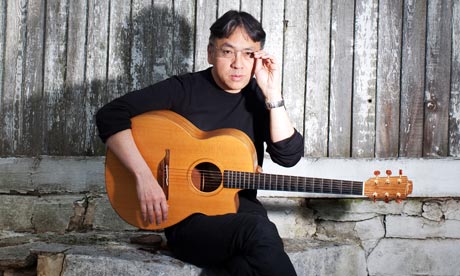
I'm always trying to make something that is impossible to film. Why would somebody just read a novel when they can see it on TV or in the cinema? I really have to think of the things fiction can do that film can't and play to the strengths of the novel. With a novel you can get right inside somebody's head.
I started as a songwriter and wanted to be like Leonard Cohen. I've always seen my stories as enlarged songs.
I'm not at all interested in the brave who fight against the odds and win. I am interested in those who accept their lot, as that is what many people in the world are doing. They do their best in ghastly conditions.
Even though I spent the first five years of my life in Nagasaki, going to Japan can be really difficult. Even if they know I've been bought up in the west they still expect me to understand all the subtleties of their culture and if I get it wrong it matters much more than if a British person gets it wrong. I find it intimidating.
I think jogging is bad for your health. All that pressure on the knees and back cannot be good for you.
When I was younger I didn't read that much. I was more interested in film and music. Now I'm curious. I want to know what it's all about. I've just finished Gulliver's Travels and started Samuel Johnson's A Journey to the Western Islands of Scotland.
From the very beginning I was close to the film of Never Let Me Go. It started with talking about it informally with Alex Garland, the screenwriter, just as friends. I visited the set quite often and I saw some of the rougher cuts. Remains of the Day was different. I didn't see that until it was finished.
My novel The Unconsoled received a hail of abuse, but it was what I needed. I was ready to embrace controversy. I'd just had a bestselling novel [Remains of the Day], won the Booker prize and the film of it had just been nominated for eight Oscars. I could easily have continued producing well-shaped novels that would get kind reviews, but I felt if was going to do something different and difficult, now was that time.
I worry about the future of the book industry. Bookshops are disappearing fast and I really fear for Waterstone's. If that goes we've lost a huge layer from our culture. There will be no sense of a meeting place anymore.
Becoming a father had a profound effect on me. You can't know children until you have a child. It's the emotional journey. It's a deep change to your life and the way you look at the world. There's somebody else you care about rather than yourself, so your whole emotional spectrum changes. Being a father really influenced me when I was writing Never Let Me Go. The characters' lack of family is an underlying theme.
I've been fantastically lucky. Especially as I've made very few concessions to commercialism, so I couldn't complain for one moment. Many writers in history have not had it as easy as I have. I've been lucky to be there at the right time.
Never Let Me Go opens nationwide on 11 February

